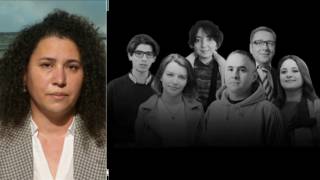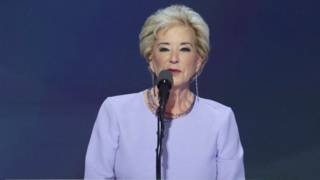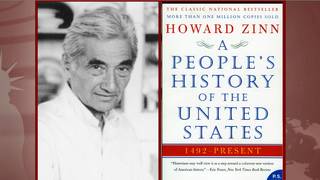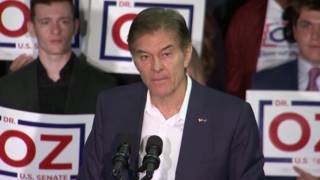
Related
Guests
- John Fordpresident of the Jefferson County Education Association and a social studies teacher at Moore Middle School.
- Ashlyn MaherChatfield High School senior and one of the students protesting the proposed curriculum changes.
After a county school board in Colorado proposed to rewrite the district’s high school U.S. history curriculum to stop teaching about civil disobedience, students and teachers have responded with acts of civil disobedience of their own. Classes have been canceled twice in Jefferson County as teachers stage mass sick-outs and students walk out of classes. At a protest last week, hundreds of Denver-area high school students held cardboard signs with slogans including, “Don’t make history a mystery” and “Keep your politics out of my education.” The protests began after the school board announced it was considering reviewing the curriculum of Advanced Placement history courses and adding more material to “promote citizenship, patriotism, essentials and benefits of the free-market system, respect for authority and respect for individual rights.” The proposed changes also call for the removal of classroom materials that “encourage or condone civil disorder, social strife or disregard of the law.” In addition, teachers are protesting a pay-grade system that ties their salaries to performance reviews. We are joined by two guests: John Ford, president of the Jefferson County Education Association and a social studies teacher at Moore Middle School, and Ashlyn Maher, a Chatfield High School senior and one of the students protesting the proposed curriculum changes.
Transcript
JUAN GONZÁLEZ: On Monday, two high schools outside of Denver, Colorado, canceled classes after dozens of teachers called in sick in protest of the county school board’s proposal to revamp the district’s history curriculum. This is the second time in two weeks that teachers have staged what they’re calling a “sick-out,” with 72 of 102 teachers at Golden and Jefferson high schools reporting absent on Monday. Teachers are also protesting a pay-grade system that ties their salaries to performance reviews. Last week, hundreds of Denver-area high school students staged a walkout to voice their concerns over the proposed changes to the history curriculum. They held cardboard signs with slogans like “Don’t make history a mystery” and “Keep your politics out of my education.”
AMY GOODMAN: The protests began after the Jefferson County School Board announced it was considering reviewing the curriculum of Advanced Placement history courses and adding more material to, quote, “promote citizenship, patriotism, essentials and benefits of the free-market system, respect for authority and respect for individual rights,” unquote. The proposed changes also call for the removal of course materials that, quote, “encourage or condone civil disorder, social strife or disregard of the law,” unquote. Newly elected school board member Julie Williams recently criticized how history is currently taught, saying, quote, “It has an emphasis on race, gender, class, ethnicity, grievance and American-bashing while simultaneously omitting the most basic structural and philosophical elements considered essential to the understanding of American History for generations,” she said.
Well, for more, we go to Denver, Colorado, where we’re joined by two guests. John Ford is with us, president of the Jefferson County Education Association. He’s a social studies teacher at Moore Middle School. And Ashlyn Maher is with us, Chatfield High School senior, one of the students protesting the proposed curriculum changes.
We also invited Jefferson County school board member Julie Williams to join us on our program but did not receive a response.
John Ford and Ashlyn Maher, welcome to Democracy Now! Ashlyn, when did you get a sense that things were changing?
ASHLYN MAHER: Well, I’ve been paying attention to the school board for the past year, and I have been increasingly more concerned about what’s been going on. And when I heard about the first teacher sick-outs, I realized that more students were interested in being involved in standing up for their education, so I took the incentive and just started educating people. I wanted to let them know what was going on, so I started presenting unbiased information, posting on Facebook and talking to people in the hallways. And before we knew it, we had a huge following.
AMY GOODMAN: John Ford, explain exactly what is going on.
JOHN FORD: Well, over the last 10 months, we had a school board majority that was elected into office—they were a conservative group—that started to push a conservative agenda. And last week, two weeks ago, when this proposal came out to create a community—a committee to censor certain parts of our curriculum, I think that’s what hit the nerve. And it not only hit a nerve with the educators in Jefferson County, but it really hit a nerve with our students, our parents and community folks as a whole.
JUAN GONZÁLEZ: And this Julie Williams, who’s leading the charge on this issue in the school board, to your knowledge, what are her credentials for being able to analyze and dissect the problems of the American history AP curriculum?
JOHN FORD: Well, as far as I know, none.
ASHLYN MAHER: Yeah, she released a statement saying that she does not have the authority herself and the background in history to make those judgments, which is why she was creating the committee. But she also never released any statements that the people on the committee would have those qualifications.
AMY GOODMAN: Speaking on MSNBC, Jefferson County school board member Julie Williams defended her proposed changes to the curriculum.
JULIE WILLIAMS: I’m not saying let’s not teach history accurately; what I’m saying is let’s not encourage our children to disobey the law.
AMY GOODMAN: Can you respond to that, Ashlyn Maher?
ASHLYN MAHER: I am not aware that I broke any laws. I think that I was standing up for what I believe in, and that is what, you know, people in America have done for centuries. It’s the foundation of our country. I took AP U.S. history myself, and all I was presented with were the facts. And then I made the opinions based on those facts. I was never told what to think. And these protests are entirely student-led, and it’s what people think is right.
JUAN GONZÁLEZ: And, John Ford, while the students are involved in their protest, the teachers also have particular grievances in terms of policies of the school board. Could you talk about the concerns that led to the sick-outs of the teachers?
JOHN FORD: Well, once again, I think it’s a culmination of things. We have a board majority that consistently over the last 10 months have—they’ve been secretive, wasteful with taxpayer money and disrespectful to our community. So, we put all of those things together, and then you put in this new committee to sanitize or purify curriculum, I think that’s where the nerve was hit again. And we’re concerned about—the AP, or the College Board, is a nationally recognized institution that goes throughout all the United States and several different countries. And this one hurts kids. So, you know, the teacher walkouts and the student protests and the parent concerns are all stemming from multiple issues.
JUAN GONZÁLEZ: But what are specifically the teacher concerns that are being expressed in those sick-outs?
JOHN FORD: Well, first, we’ll go back to the AP and the censoring thing. But over the last 10 months, you know, our teachers’ association has been engaged in negotiations with their contract. And the contract itself is something that’s been a 45-year tradition in our school district, and we’ve had a long history of collaboration with the school board and the superintendent. And that’s all coming to an end. At the end of last year in May, we went into negotiations, they stalled out, and we went to an independent fact finder. And the fact finder, his recommendations, we went into whatever he determined that the teachers’ association would agree with, and we hoped that the school district would, too. But at the end of the day, the fact finder found in favor of the teachers, and the school board rejected those recommendations and moved on with their own agenda and unilaterally instituted a salary scheme that’s based on merit pay, that’s very, very confusing, and to this day I still don’t think they know what’s going on.
AMY GOODMAN: Soon after the College Board issued its new guidance for its Advanced Placement U.S. history course, the Republican National Committee condemned the new standards as “radically reinventionist” and anti-American. The College Board has said it stands behind the Jefferson County student protesters. It’s also warned that course can no longer officially bear the AP designation if a school or district censors essential concepts from an AP course. Also speaking on MSNBC last week, the president of the Jefferson County PTA, Michele Patterson, voiced her concerns about academic censorship.
MICHELE PATTERSON: This is not just about AP history. This committee would have the ability to look at all curriculum at any grade level and present it to the board—present to the board anything that they find objectionable. And then the board would have the chance to look at their objections and take potential action. So it really opens the door wide to censorship.
AMY GOODMAN: That was PTA President Michele Patterson on MSNBC. Last week on Fox News, host Gretchen Carlson criticized students and teachers in Colorado protesting proposed changes to their history curriculum.
GRETCHEN CARLSON: And what does it say about our young people in this country and the teachers joining the protests that promoting patriotism is now a negative? Ironically, the new curriculum being proposed is all about promoting individual rights, like protesting. The new curriculum would also teach a free-market system, like the one we already have. It would also encourage that there be no disregard for the law. Isn’t that why we have laws on the books?
AMY GOODMAN: That’s Fox News host Gretchen Carlson. Ashlyn Maher, you’re a high school senior. Can you respond?
ASHLYN MAHER: Well, I saw this interview, and further in the interview she calls all of us little punks. And personally, I do not agree with what she is saying. I am saying that we are standing up for our individual rights, and we want to make sure that we learn the facts, patriotic or not. Everyone has made mistakes, and we learn history and we learn those mistakes as to not make them again in the future. You know, those who don’t learn history are doomed to repeat it. So that is what we are saying.
JUAN GONZÁLEZ: And, John Ford, your reaction, as a longtime teacher, to the continuing efforts of some forces in this country to sort of try to determine what you, as a teacher, and what educators can teach their students?
JOHN FORD: Yeah, I think the frustrating part of this is, we have professionals in classrooms who dedicate their entire lives to teaching kids, and those professionals know better. And I want to make this point, because I had a conversation with a math teacher a couple of months ago. And she was distraught, and I asked her, you know, “What’s going on?” And she said, “Well, this board majority is using my passion against me.” And I wake up every day with that ringing in my ears.
AMY GOODMAN: The New York Times writes, “The board … has drawn praise from Americans for Prosperity-Colorado, a conservative group affiliated with the Koch family foundations. In April, Dustin Zvonek, the group’s director, wrote in an op-ed that the board’s election was an 'exciting and hopeful moment for the county and the school district.'” Are the Koch brothers involved with this school board?
JOHN FORD: I don’t know. But what I do know is, Jefferson County has a long tradition of being a collaborative education institution for the entire community. And one thing that I’d like to point out, I was born and raised there, and my kids go to these schools. And Jefferson County is a community. And that community really means something. And I’m sure, if you talk to these students, that’s why they’re reacting the way they are. If there’s outside forces trying to push an agenda in our school district, that would be really concerning. And you know what? We’ll find out.
JUAN GONZÁLEZ: But if there was this extreme group that got control of the school board, that obviously means that there was not a high level of participation in the school board elections. Could you talk about that and the dangers when communities do not get involved in their school board elections?
JOHN FORD: Yeah, about 33 percent of the total population that could vote voted. Elections matter, and especially school board elections. Lots of times we put focus on the national-level and maybe our state-level elections, but our school board elections are going to be unbelievably critical in the next couple of election cycles.
AMY GOODMAN: Ashlyn, you’re a high school senior. Will you be voting in the next elections?
ASHLYN MAHER: I sure hope so, because this issue does not stop affecting me when I graduate. I have a little brother and a little sister that will grow up in the Jeffco community, and I want them to have the best education possible. And I really want them to be presented with the facts, just like I was. I really don’t think that they should be taught somebody else’s opinion.
AMY GOODMAN: Well, Ashlyn Maher, I want to thank you for being with us. Ashlyn Maher, Chatfield High School senior, one of the students who is leading the protests over the proposed curriculum changes. And John Ford, president of the Jefferson County Education Association and social studies teacher at Moore Middle School.
When we come back from break, an astonishing story about a 16-year-old high school sophomore who was accused of stealing a backpack. He wound up on Rikers Island, in jail for close to three years, two of those years in solitary confinement. You’ll find out his story. Stay with us.












Media Options